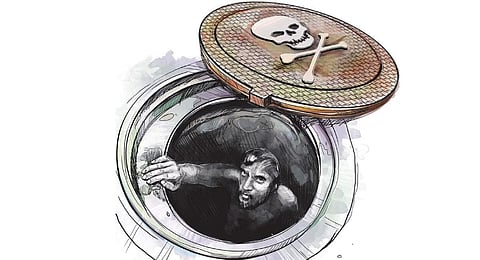End manual scavenging for good and for all
The incidence of school students being made to clean a septic tank is not just shocking, but alarming too. It happened with students of classes seven to nine at Morarji Desai Residential School in Yeluvahalli, Karnataka, on December 1. Had a video of this act not gone viral a few days ago, it would have remained under wraps. It is worrisome that a school management ordered such an activity; even more so because the children were asked to do the job without safety gear. Many people have died around the country while cleaning manholes and sewers from asphyxiation upon inhaling excessive carbon monoxide. Despite 920 such deaths across India between 1993 and 2010, and 339 more recorded between 2018 and 2023, the school obviously ignored the dangers. Four people including the principal were suspended when the district and state authorities finally swung into action. A probe has been ordered and the state government is awaiting the report amid brimming public anger.
Manual scavenging is among the cruellest forms of work. There are modern technologies available to clean manholes and septic tanks which eliminate the threat people engaged in it are exposed to. The school authorities evidently ignored—or had no clue about—the Prohibition of Employment as Manual Scavengers and their Rehabilitation Act of 2013. The law states that any person or agency that engages people for manual scavenging is punishable under Section 8 of the Act with imprisonment up to two years or fine up to Rs 1 lakh, or both.
Even the Supreme Court in its landmark 2014 judgement directed all states to abolish manual scavenging and take steps to rehabilitate such workers—58,098 manual scavengers have been identified till recently, but the final figure is likely to be much higher. The court had stated, “For sewer deaths, entering sewer lines without safety gears should be made a crime even in emergency situations.” And here were a group of teenagers forced into it on December 1. A school disdainfully pressing students into manual scavenging—whether labelling it as ‘social service’ or not—is an indication of how little some educators value the Supreme Court and the law. A more stringent law and an iron hand to enforce it are needed to stop this practice for good.

